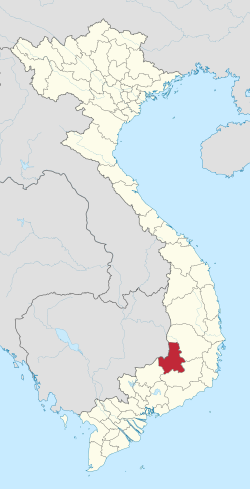Đắk Nông Province
|
Đắk Nông Province Tỉnh Đắk Nông |
|
|---|---|
| Province | |
 Location of Đắk/Ðắc Nông within Vietnam |
|
| Coordinates: 11°59′N 107°42′E / 11.983°N 107.700°ECoordinates: 11°59′N 107°42′E / 11.983°N 107.700°E | |
| Country |
|
| Region | Central Highlands |
| Capital | Gia Nghĩa |
| Area | |
| • Total | 6,515.6 km2 (2,515.7 sq mi) |
| Population (2014) | |
| • Total | 571,300 |
| • Density | 88/km2 (230/sq mi) |
| Demographics | |
| • Ethnicities | Vietnamese, Ê Đê, Nùng, M'Nông, Tày |
| Time zone | ICT (UTC+7) |
| Area codes | 261 (from 17 June 2017) 501 (until 16 July 2017) |
| ISO 3166 code | VN-72 |
| Website | www |
Đắk Nông (![]() listen), also Ðắc Nông, is a province of Vietnam. It is located in the country's Central Highlands. The provincial capital is Gia Nghĩa.
listen), also Ðắc Nông, is a province of Vietnam. It is located in the country's Central Highlands. The provincial capital is Gia Nghĩa.
Đắk Nông borders Đắk Lắk Province in the north, Lâm Đồng Province in the south-east, Bình Phước Province and Cambodia in the west. It is located in the southern part of the Central Highlands, about 500m above sea level. The terrain is lower in the west. Đắk Nông has large fields and lakes in the south. Đắk Nông has three main river systems: Ba River, Serepok River and other small rivers
The average temperature is 24 degrees Celsius. The rainy season starts in May and ends in October. The dry season starts in November and ends in April the year after.
Like Đắk Lắk Province, coffee, pepper and rubber are the most important products of Đắk Nông. Đắk Nông is a potential province of tourism. There are many beautiful sites such as Ba Tang Waterfall, Dieu Thanh Waterfall, and Nam Nung pine hill.
Đắk Nông is subdivided into 8 district-level sub-divisions:
They are further subdivided into 5 commune-level towns (or townlets), 61 communes, and 5 wards.
...
Wikipedia
